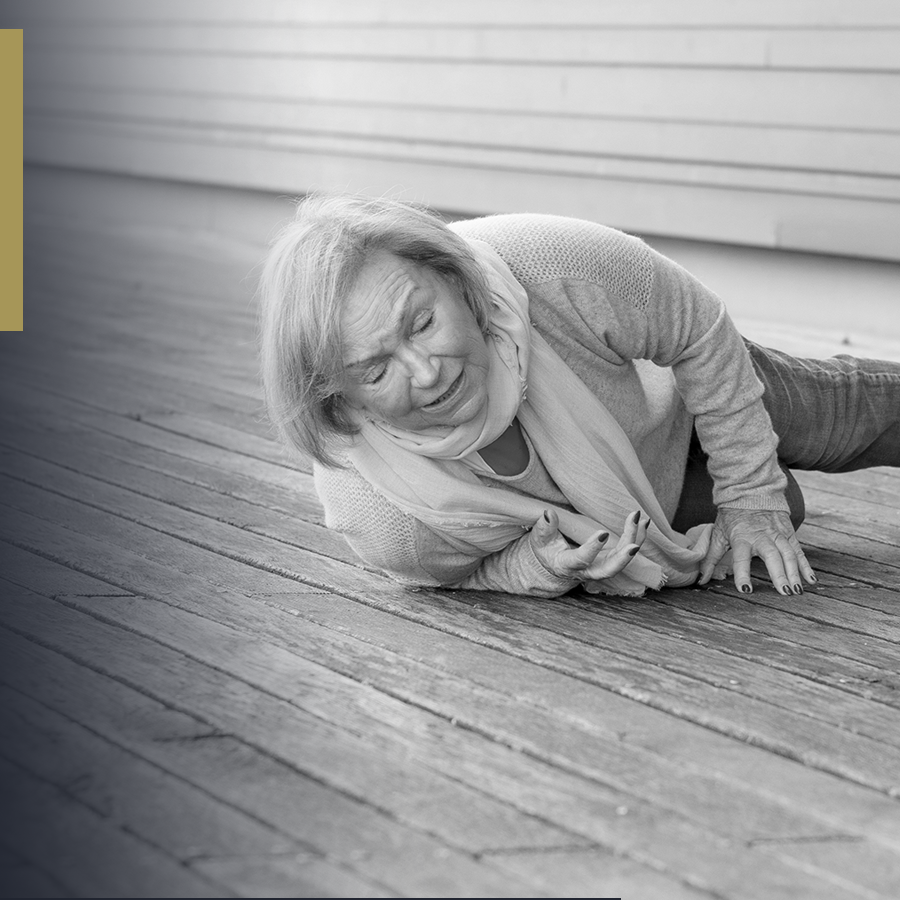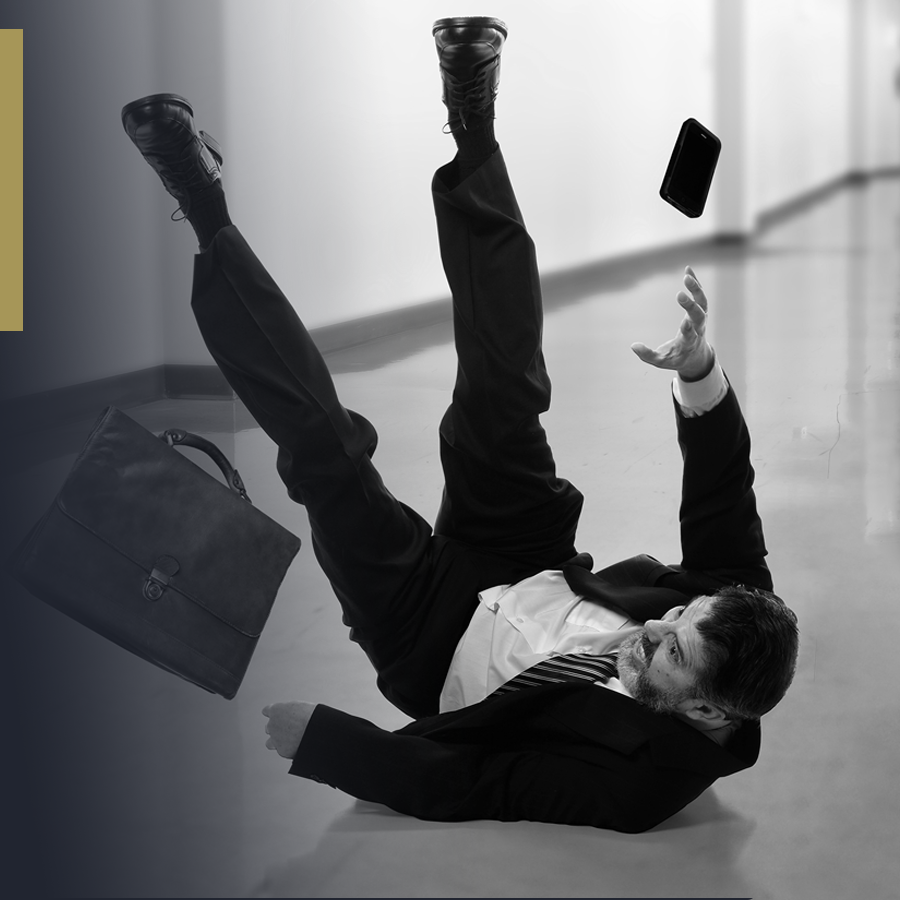Slip and Fall Accidents
Slip and Fall Accidents In Henry County
Henry County Premises Liability Attorney

Imagine you are walking through one of Henry County’s grocery stores, picking up your necessities for the week. Suddenly, your foot shoots out from under you; you fall to the ground, wrenching your knee and banging your arm against a shelf.
You try to stand back up quickly, but you can’t. Your leg is too tender to move, and you fear something may have torn. Bystanders rush over to help, but their worry is embarrassing.
As you sit on the ground waiting for the paramedics, you notice a large puddle on the floor and a broken bottle of juice next to it. That must have been what you slipped on.
You berate yourself in your head – “Why didn’t you notice it before? How could you be so careless?” you think. But in this scenario, you were not the careless one.
No Ordinary Accident
Accidents happen, it’s true. But not all accidents are alike. If you slip and fall on another person’s property, it may not be a simple mishap.
Georgia Code Section 51-3-1 says:
Where an owner or occupier of land, by express or implied invitation, induces or leads others to come upon his premises for any lawful purpose, he is liable in damages to such persons for injuries caused by his failure to exercise ordinary care in keeping the premises and approaches safe.
In plain English, this means that the owner of a property is responsible for the safety of any guests. If hazards exist in a space where visitors are lawfully allowed to gather, and someone is injured, the property owner could be held liable. So what does this mean for McDonough residents?

What is Premises Liability?
The above statute outlines a concept known as “premises liability” Essentially, if guests are lawfully invited into a space, the owner is liable for their safety while they are on the property.
This law applies to public places such as stores, stadiums, shopping malls, concert halls, and more. Government-run spaces (like parks and municipal buildings), as well as private residences, are also bound by this law.
The owner of the property may not be the only one liable for visitor safety. If a property manager, store owner, tenant, or superintendent works on the premises, they are also required to keep the premises safe for guests.
The law says that property owners or managers must “exercise ordinary care” in keeping their premises safe. Hazards – like broken handrails, cracked sidewalks, or loose floorboards – should be repaired as soon as they are noticed. If a repair cannot be made, the owner or manager should warn guests of the risk.
If a hazard is not swiftly dealt with and a guest is injured, the property owner or manager could be found guilty of negligence.
Contact us today
Schedule a confidential consultation.
I Fell and Hurt Myself on Someone’s Property – Now What?
In the hypothetical scenario of the grocery store, there are some key details that could make this a viable premises liability case.
First, there was a large spill on the ground that had not been cleaned; this presents a clear hazard to anyone walking in the store. Secondly, there was no caution sign or employee present to warn guests of danger.
If something like this happened to you, the property manager or owner might be liable for your injuries, and therefore, they are responsible for covering the costs of your medical bills and any other expenses related to the injury.
Of course, receiving compensation for your injury isn’t as simple as saying, “You owe me for this accident.” How can an injured party receive the reimbursement they are owed?
- Report the Incident
Slipping and falling in public can be embarrassing. Usually, people blame themselves after a fall, assuming their own clumsiness caused the accident. Your instinct might be to quietly get up and sneak away without causing a scene.
However, if you are injured in a fall, you must not sweep it under the rug. Firstly, the hazard that caused your accident could injure other people. Secondly, reporting your injury is an important step in proving a premises liability claim.
If you are able, speak with the property owner, store manager, or an employee. Let them know where you fell and why. Point out the hazard and explain your injury. Make sure to get this person’s name and contact information for your records. If you end up bringing a suit against the owner, this information will be vital.
- Watch Your Words
It’s habit for most people to say, “I’m okay” or even “It’s no problem” following some kind of fall. You might even be tempted to say “I’m sorry” for inconveniencing those around you. But after a fall, these are exactly the words you should not use.
Believe it or not, this sort of language could be used against you when trying to prove your case. The property manager’s law team might allege that by reflexively saying, “It’s alright,” when the manager apologized for your fall that you were admitting you weren’t actually hurt.
If you fall in a public place, avoid saying anything that could be construed as an apology or an assumption of fault. It’s better to be silent or to stick to factual statements.

- Speak with Witnesses
If anyone witnessed your fall, speak to them as soon as possible. You’ll want to get their names, contact information, and their version of what happened.
If your case ends up in a lawsuit, witness statements can be very helpful in proving your case.
- Get Pictures of The Scene
Photographs are another valuable tool that can be used as evidence of your claim. Try to get pictures of the accident scene as quickly as possible before anything is changed or cleaned up.
In the grocery store example, a well-meaning employee may come along and try to clean the spill before anyone else encounters it. Unfortunately, once the hazard is gone, so is an important piece of evidence.
If you cannot take pictures yourself, try to have a witness do so. Photograph the hazard in detail from multiple angles. Also, include any parts of the scene that provide necessary context – like the absence of a caution sign. Also, take pictures of your wounded body part(s) to show the full picture of your injuries.
- Visit a Doctor
Evaluations from medical professionals are vital to personal injury cases. If you were hurt on someone else’s property, you should visit a doctor as soon as possible.
Depending on the severity of your injuries, you may want to visit an emergency room. If you would rather see your general practitioner, be sure to do so within 72 hours of your accident. If you don’t have a primary care physician, you can go to an urgent care center or clinic.
Even if your injuries seem relatively minor, it’s still a good idea to have a doctor’s opinion. Some injuries can worsen over time; the minor crick in your neck could prove to be a hairline fracture or lead to a compensatory injury weeks after the accident.
Follow any instructions from your doctor, and do not stray from your treatment plan. The property owner’s insurance provider will be looking for any loopholes that could get them out of paying for your medical bills. If you go against doctors’ orders, they could use it as evidence that you weren’t truly hurt.
- Hire a Personal Injury Lawyer
Proving negligence is the trickiest part of a personal injury claim.
To receive compensation for your medical bills and any related costs (like prescriptions or lost wages), you will have to prove that the property owner or manager was negligent. Additionally, you must prove that your accident would not have occurred if the property were correctly maintained.
It is no easy feat to prove negligence. If your case goes before a judge, you will want support.
Scott Key & Associates have represented numerous clients in premises liability cases. Our attorneys have access to records that laypeople simply do not have. Our experience with the legal system means that you will never miss a filing deadline or be lost in the legal weeds.
With a team of professionals on the case, you can rest and focus on your recovery.

Helping Henry County Residents With Slip and Fall Legal Matters
If you or someone you love was hurt by a careless property owner, you have options. You are not responsible for shouldering the cost of another person’s negligence.
To get an expert opinion on your case, contact Scott Key & Associates at 678-610-6624.
Contact us today
schedule your free case evaluation